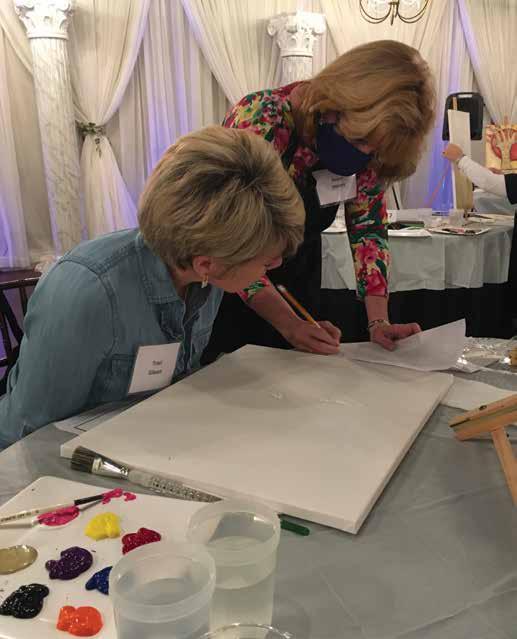
4 minute read
ScART
Every scar tells a story.

Advertisement
Traci Gibson (left) gets instruction from local artist and certified ScART instructor Susan Hebert at Memorial’s ScART event.

Traci Gibson will never forget March 18, 2020. It’s the day she went in for a routine mammogram — a mammogram that came back questionable. A follow-up biopsy and MRI led to the discovery of stage one invasive, ductal, adenocarcinoma in her right breast.
“This would come as a shock at first, and then a secret that I could not reveal. My brother Trey had just been brought to ICU at Memorial because his stage 4 colon cancer was back with a vengeance, and I did not want to alarm my parents. I had the incredible support from my husband, J.J., and our children, Molli and Griffin. And, I had my Jesus! He never left my side. He actually carried me the entire way. I was filled with God’s grace, and I found Him everywhere I turned.”
On Monday, March 30, Gibson came to Memorial for an appointment with Memorial Medical Group Breast Surgeon Amanda Ellington, MD, to discuss her treatment plan. Due to the recent precautions the COVID-19 pandemic brought on, she had to go alone. When she got out of the car, she looked up and realized that she could see where her brother’s ICU room might be.
“I know that the Holy Spirit put me in the same place as Trey, and I know that we both felt the others presence,” she recalls. “We were there for each other. He passed away that night.”
Dr. Ellington walked Traci through the treatment plan laid out by her Memorial Medical Group Oncologist Michael Broussard, MD, and Radiation Oncologist James Maze, MD. Elective surgeries were delayed due to COVID-19, and Traci was not able to have a lumpectomy until the end of April. The surgery was a success. Margins looked great, sentinel node was located and very early stage one breast cancer was now gone. She then went through a 10 week course of radiation. Today, she remains cancer free.
For cancer patients like Gibson, Covington based business owner, Lisa McKenzie, created an empowering group painting experience called “ScART” which stands for “Scar Art”. This is the first-of-its-kind painting experience where participants paint their surgical or emotional scars on canvas in a group setting. The purpose of the program is to bring survivors together so they can support one another while also learning that they are not alone in their journey, and are stronger than they realize.
“Emotional healing from surgical scars varies from one cancer survivor to the next and talking about it often feels taboo,” explained McKenzie. “ScART provides survivors the opportunity to gather and talk with other survivors, and hopefully help view their scars with a new lens.”
Memorial held the first ScART event in Southwest Louisiana in March at the Charleston Ballroom. Plans are in the works to continue and grow the program locally, expanding to patients with all forms of cancer. Gibson was one of the participants at the ScART event, painting alongside Dr. Ellington who is a big supporter of the event, and who created her own canvas on the insights she gained treating cancer patients.
“I found it to be empowering,” Gibson says. “I met many other women with different stages of breast cancer. Some women had just gone through treatment, and others have been cancer free for years. It was thought provoking and a celebration of one of life’s greatest victories.”
Prior to class, ScART participants are asked to complete a simple online homework assignment to prompt their approach to their painting, and to start their healing journey. Part of the homework assignment is to hand-sketch their scar on paper, which they bring with them to class. Once at the event, guests transfer the scar drawing to canvas. Local artist Susan Hebert led the class. She became a certified ScART instructor last year.
“It becomes a free-form art class, which allows them to tap into their emotions during the painting experience,” Hebert says. “After the class, ScART guests have the opportunity to discuss their relationship with their scars and share stories with the group if they feel comfortable. The final product is a unique and abstract piece of art with a special meaning.”
For participants that chose to do so, Memorial created a print of their artwork that will be displayed in the breast health center. The original pieces are returned to the participants.
If you are interested in more information about ScART, and want to get on the list for Memorial’s next event, email Community Outreach Specialist Allie Livingston at alivingston@lcmh.com, or call 337.494.2935, or go to www.lcmh.com/scart





